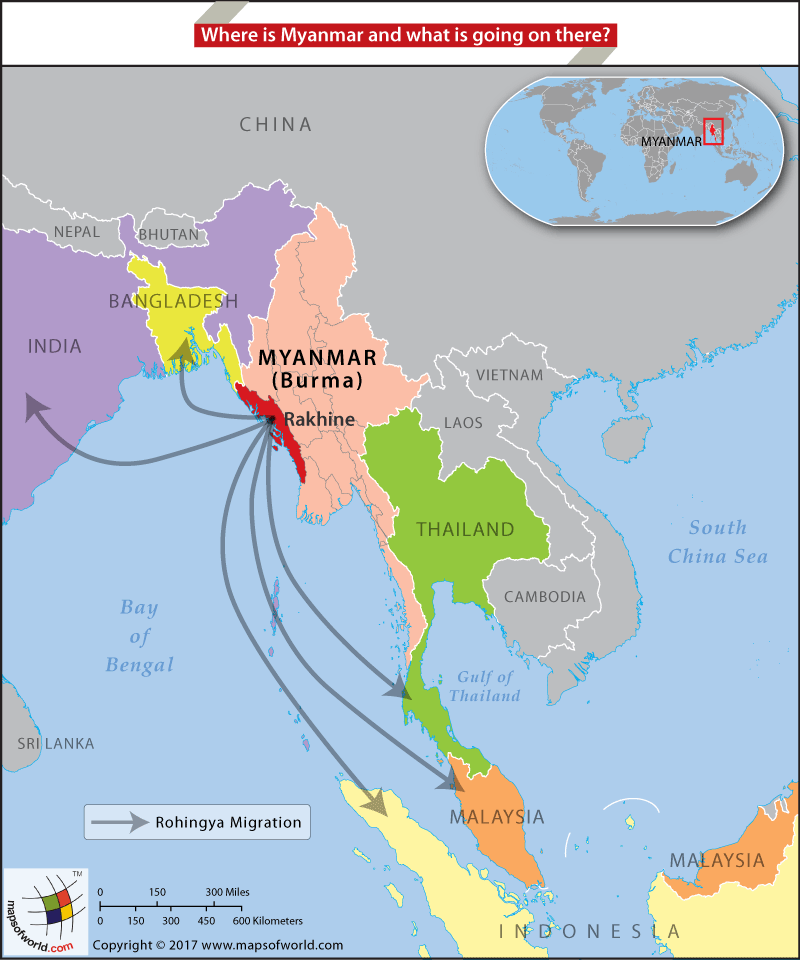Where is Myanmar? What is Going on There?
Where is Myanmar?
The Republic of the Union of Myanmar, previously known as Burma, is located in south-east Asia. Thailand borders it in the south-east, Laos in the east, China in the north and northeast, India to the northwest, Bangladesh to the west, and the Bay of Bengal in the south. The capital of Myanmar is Naypyidaw, and the majority in the country practice Theravada Buddhism.
The history of Myanmar is marked by turbulent strife – first against British colonial rule, then against the military junta, and then the civil war that has been fought between the various ethnic groups of the country. More recently, in 2015, democratic elections were held after two decades, and a popular government was installed. The recent Rohingya crisis has once again cast a shadow over the country.
Who are the Rohingya?
The Rohingya are a minority ethnic community that live in Myanmar but are not recognized by the government as indigenous Myanmar citizens. As of 2015, about 1.1 million Sunni Islam practising Rohingya Muslims were living in the state of Rakhine (in the country of Myanmar). The ethnic violence in Myanmar stems from this dispute. The government of Myanmar claims that the community entered the country from Bangladesh during the British colonial rule and is still living on as a refugee community.
Bangladesh, on the other hand, claims that the Rohingya are not Bangladeshi since they have lived in Myanmar for over six centuries now. This has left the community mostly stateless.
The Rohingya community (in Myanmar) has been living in a state of abject poverty. The living conditions are dismal, and as a group, they have minimal civil rights. The community has no access to healthcare or education and cannot marry outside the community.
The Rohingya Muslims of Myanmar have been facing systemic discrimination, gross human rights violations, and abuse.
Violent attacks against members of the Rohingya community are very common, according to the UN. Waves of violence often erupt, and hundreds are killed or injured. So much so that over the years, these attacks are being considered a form of ‘ethnic cleansing,’ and has been alleged as a government-sanctioned genocide.
What is the recent crisis?
Last year, a group of militants from the Rohingya community mounted an armed attack on numerous Myanmar border outposts. In response, the state’s army attacked and killed hundreds of young boys and men. Women were raped, and thousands were forced to flee. This year again, the militants from the community attacked military bases, and the Myanmar forces responded furiously, destroying over 80 villages and killing hundreds of civilians. News reports suggest that the Myanmar government had restricted the entry of food and water supplies to the Rakhine region as well.
Some 370,000 Rohingya have fled their homes over the past years and sought refuge in the neighboring country of Bangladesh. Furthermore, there are about 40,000 Rohingya refugees in India. Both Bangladesh and India are not interested in letting the refugees stay on indefinitely and want Myanmar to take them back.
Aung San Suu Kyi, the State Counsellor, is the head of the elected government but does not control the military. To date, Suu Kyi has been unwilling to denounce this treatment of the Rohingya for fear of losing the support of the Buddhist majority and the powerful military. Aung San Suu Kyi is a Nobel Peace Prize awardee, and her silence is drawing severe flak from all over the world.
The United Nations Security Council has strongly condemned the violence against the civilian community in Myanmar and has asked the country to ensure that peace is restored and the safety of the Rohingya ensured. As yet, the crisis remains unresolved.
Check out this – Myanmar Map and Other 8 Related Burmese Maps for more maps and info about Myanmar.
Related Maps:



